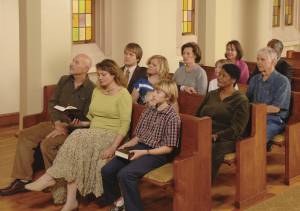Pick up any Christian magazine or read one online, and you’ll find many theories about why churches are losing attendance. Many people believe that the church is no longer relevant. Some think that adults are choosing to ignore God. There are others who see the church as too hierarchal. In Canada, about 25 percent of adults identify as having no religious affiliation. Many studies have been done about the actual number of people who stop attending church, but very few look at the reasons why. The Church of Scotland, which is Scotland’s national church, commissioned a study about the lack of attendance. The findings were surprising.
One of the key beliefs in failing congregations is that the members lose faith in God and this is why they stop attending. Another issue that has been thought to ravage church membership is disagreements. Women still do not find support in leadership in many churches. The LGBTQ community is also disenchanted with the church, which is another reason that people stop attending. However, Dr. Steve Aisthorpe, the researcher who carried out the study for the Church of Scotland, found something interesting.
Are People Leaving Church or God?
Dr. Aisthorpe discovered that about 66 percent, or two-thirds, of those who left the church now practice and worship in different ways. Many still gather with like-minded individuals to discuss theological issues and pray together. They choose different venues, such as homes or parks, or even do activities together where they can share their faith and address questions they have about their convictions. Aisthorpe also found that this phenomenon was not different in rural and urban churches.
This suggests that it is the organization of the church that keeps people away. More people are turning away from large congregations for a more personalized worship ritual. Arguments and division may turn some people away from church, but this doesn’t indicate that they stop believing in God. A spokesman for the National Secular Society states that “Churches are out of step, and the people in the pews are voting with their feet.”
The Health of the Church and Religious Community
Although Dr. Aisthorpe carried out the majority of his research in Scotland, he did not only look at his own country to get information. He looked at related research from the Western world. He found changes in the attendance of Sunday morning worship, but he doesn’t believe that should be the only measure of the health of the Christian community and faith. His research suggests that churches are in a transitional period, rather than a decline.
What happens now with the church, in whatever denomination, is up to the individual community. Pastors, priests, and religious leaders need to find what works for their own congregation. The Christian community is not the only religion that is having a hard time filling their seats. Many Jewish synagogues are finding it difficult to maintain membership rolls. In Japan, religious organizations are facing the crisis of having to close Buddhist monasteries because the smaller communities cannot afford to support the monks. The rural areas do not have the number of people they once had, and those areas with more of a population are finding that nationals are not using the services of the temples.
Another key element that Dr. Aisthorpe’s research demonstrates is that the church leaders have to stop assuming and stereotyping those who do not attend church. The reasons that keep people away may have nothing to do with their actual faith in God. It’s easy to point to other problems when the congregation fails. Instead of pointing fingers, churches need to become more relevant and change their delivery system. This is how the world works. Most faiths are buried deep in rituals and traditions that are difficult to change, but as culture changes, so must religion.



